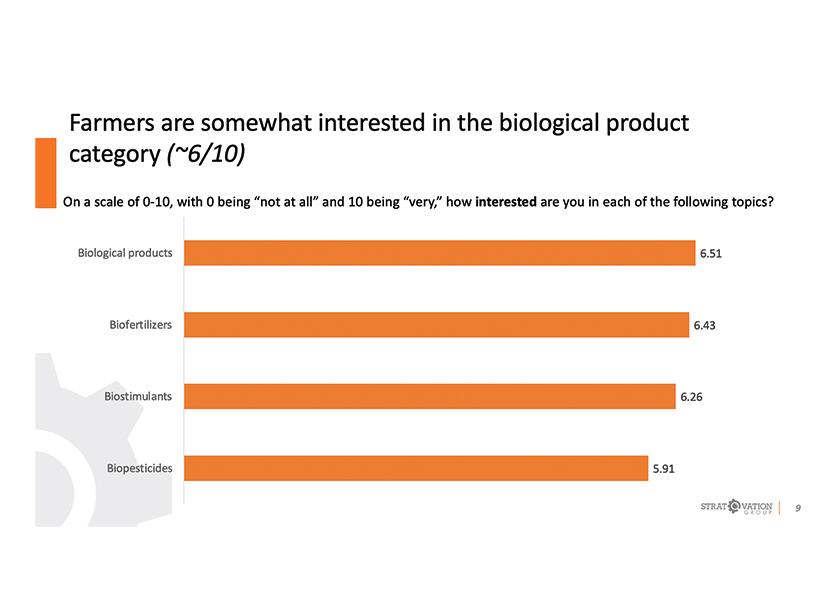Biologicals: How Ag Retailers Can Be A Springboard for Growth

This spring, Stratovation Group released a study on farmers’ perceptions on biologicals, which was supported by ARA, The Fertilizer Institute, and DCLRS, a bipartisan government relations firm.
“The goal of this work is to elevate the voice of the farmer so we can continue to serve them better,” says Stratovation CEO Cam Camfield.
He says the conversation around biologicals is occurring at the intersection of many trends: higher fertilizer prices last year, availability of particular products in crop chemistry, farmer willingness to try something new and more.
The study was done in two phases: 40 hour-long interviews and then a survey of 500 respondents—and both study groups were U.S. row crop farmers.
Here are some of the key takeaways:
- 83% of farmers in the U.S. are aware of the term agricultural “biologicals”
- 75%, were familiar with a similar term, agricultural “microbials”
- More than a third of the farmers–those reporting they were currently active users of biologicals on their crops–rated them positively, giving them a score of 7.14 out of 10
- One of the reasons cited by the farmer respondents was the use of biologicals increased nitrogen efficiency or decreased fertilizer expenses
- Of those farmers not currently using biologicals, most said they would be willing to try them if their profitability could be proven
“Awareness of the term is high, and general interest is high,” Camfield says. “But what farmers need is more granularity and more education. Specifically for biostimulants, biofertilizers and biopesticides, farmers need help understanding the nuances of those products.”
The most important measures for success reported by farmers were yield and profitability.
Camfield says he interprets the results with three insights:
- The use of biologicals is being supported by a clear economic reason to use them along with multiple constraints in the supply chain for traditional products.
- Environmentally, there’s a halo effect around biologicals being perspective as “greener” alternatives vs. synthetics.
- Farmers are starting to see improved efficacy compared to products of the past.
“Another trend we see is depending on who farmers get agronomic advice from, and where they purchase inputs could increase their likelihood of being interested in biologicals or not,” he says.
As such, he’s encouraging retailers to position themselves even more so as the trusted advisor specific to biologicals and how they could fit into a farm.
“When asked if the farmers trusted their agronomist or CCA provided by their retailer, 88% said yes,” Camfield says. “So retailers are in a powerful position to help give farmers new tools and the advice they need.”
Camfield notes how biologicals still feel like an emerging market with strong headwinds.
“Less than 10% of farmers have tried biologicals and quit using them. For the most part, farmers are on the fence or watching this space, and once they get involved they are happy. The longer you try biologicals, the higher your adoption,” he says.
Sponsoring companies made the research possible, and those include Meristem Crop Performance, BASF, Indigo, Pivot Bio, Evoia, BPIA, Certis Biologicals, AMVAC, Lallemand and Redox Bio-Nutrients.







